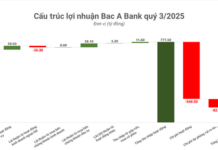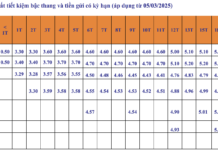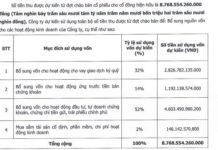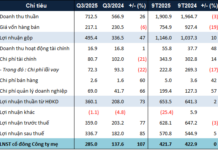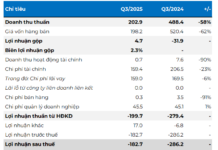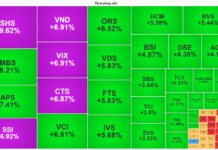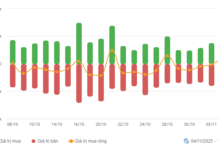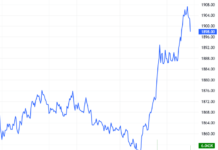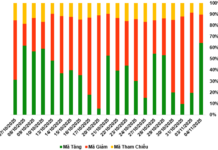Closing the trading session at the end of April, the VN-Index closed up 0.38% to reach 1,209.52 points. However, investors are unlikely to be pleased as the index has fallen by nearly 5.8% over the course of April 2024. Moreover, several trading sessions during the month witnessed the VN-Index “breaking through” the 1,200-point mark. Nevertheless, the positive point is that the main index at the end of the month’s trading (as is known) still successfully held above the 1,200 mark.
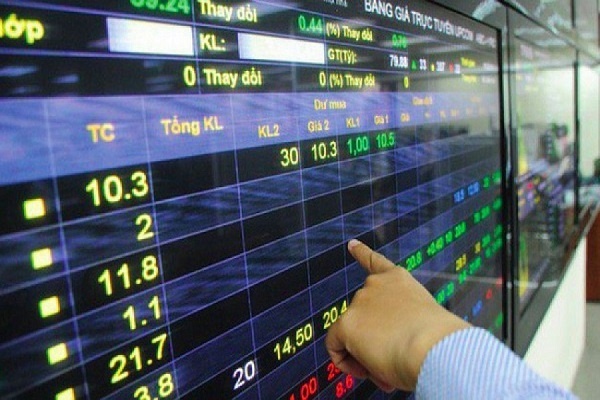
Investors have questioned whether the VN-Index’s decline is due to “tight” margins
Investors have questioned whether the decline in the VN-Index is due to “tight” margins. After all, this is a type of funding that greatly contributes to the index’s growth. For example, during the uptrend from December 2023 to the end of the first quarter of 2024, the VN-Index increased by more than 1,100 points and reached a short-term peak at the 20-month mark.
This reasoning is not unfounded, as statistics from FiinGroup show that margin debt at the 48 leading brokerage firms reached nearly VND 193.3 trillion at the end of March 2024, marking an increase of 62.4% compared to the same period last year and 11.2% compared to the end of 2023. This margin debt has surpassed the previous peak set in early 2022 (when the market surpassed the historical mark of 1,500 points). In addition, margin lending at most brokerage firms has increased significantly in the first quarter of 2024 compared to the same period last year. Notably, several companies have reported increases of several times.
In terms of margin debt, TCBS (Kỹ Thương Securities Corporation) continues to lead in terms of lending with a debt of over VND 19,087 billion as of the end of the first quarter of 2024, 17.4% higher than at the end of last year and 106.3% higher than at the end of the first quarter of 2023. Meanwhile, VPS Securities Corporation and VNDirect Securities Corporation are the two companies that have bucked the trend by showing almost no growth in margin debt in the first quarter of 2024. The margin lending of these two companies reached VND 11,157 billion and VND 9,957.6 billion, respectively, as of March 31, 2024. The most notable name is VPBank Securities Corporation (VPBankS) with the fastest growth in margin debt in the market. At the end of the first quarter of 2024, VPBankS recorded VND 8,909 billion in margin lending, an increase of more than 180% compared to the same period in 2023 and an increase of 25.7% compared to December 31, 2023.
However, brokerage firm executives believe that investors need not be overly concerned about the increase in margin debt, which has surpassed the previous peak of the VN-Index at 1,500 points.
Mr. Nguyen The Minh, Director of Retail Analysis at Yuanta Vietnam Securities Corporation, observed that the increase in margin debt in 2022 was largely due to the inflow into large accounts, such as those of business owners. This led to significant risk when these accounts were heavily liquidated, triggering a sell-off mentality among “retail” investors.
“Currently, margin funds are mainly concentrated in retail clients, and the picture is therefore quite different. Moreover, margin funding is also supported by more lending from banks. However, I think the smaller brokerage firms will face cash flow problems. This is because, according to regulations, brokerage firms can only lend against a single stock where the total value represents 5% of their equity. Overall, margin funds are not yet tight because the brokerage firms have increased their capital many times,” he said.
Agreeing with this view, Mr. Truong Hien Phuong, Senior Director of KIS Vietnam Securities Corporation, also assessed that there is currently no “tight” margin situation. “It is true that margin debt has increased sharply and surpassed the previous peak. However, considering that the capital of the brokerage companies has increased several times, it is not yet possible to say that there are signs of tightness. Moreover, individual investors do not dare to “go big” on margin borrowing due to fears of market risks amid gold price fluctuations, rising USD/VND exchange rates, etc.,” he said.
Stock market experts believe that the recent decline in the index was due to several factors, such as profit-taking after the index’s strong rise, the impact of the rising USD/VND exchange rate and gold prices, and psychological effects from foreign net selling and unfounded rumors circulating in the market. In fact, the decline in the main index had been predicted by stock market experts.
Experts from SSI Ressearch also believe that this is a short-term correction before the uptrend resumes. With the impact of Q1 2024 financial statements, the annual General Meeting of Shareholders (AGM), as well as growth-related topics such as capital increase plans and business expansion, there will still be stories that attract the attention of the market. During this period of healthy market correction, investors should focus on the big picture and the growth prospects of individual stocks to select the appropriate accumulation price range.








